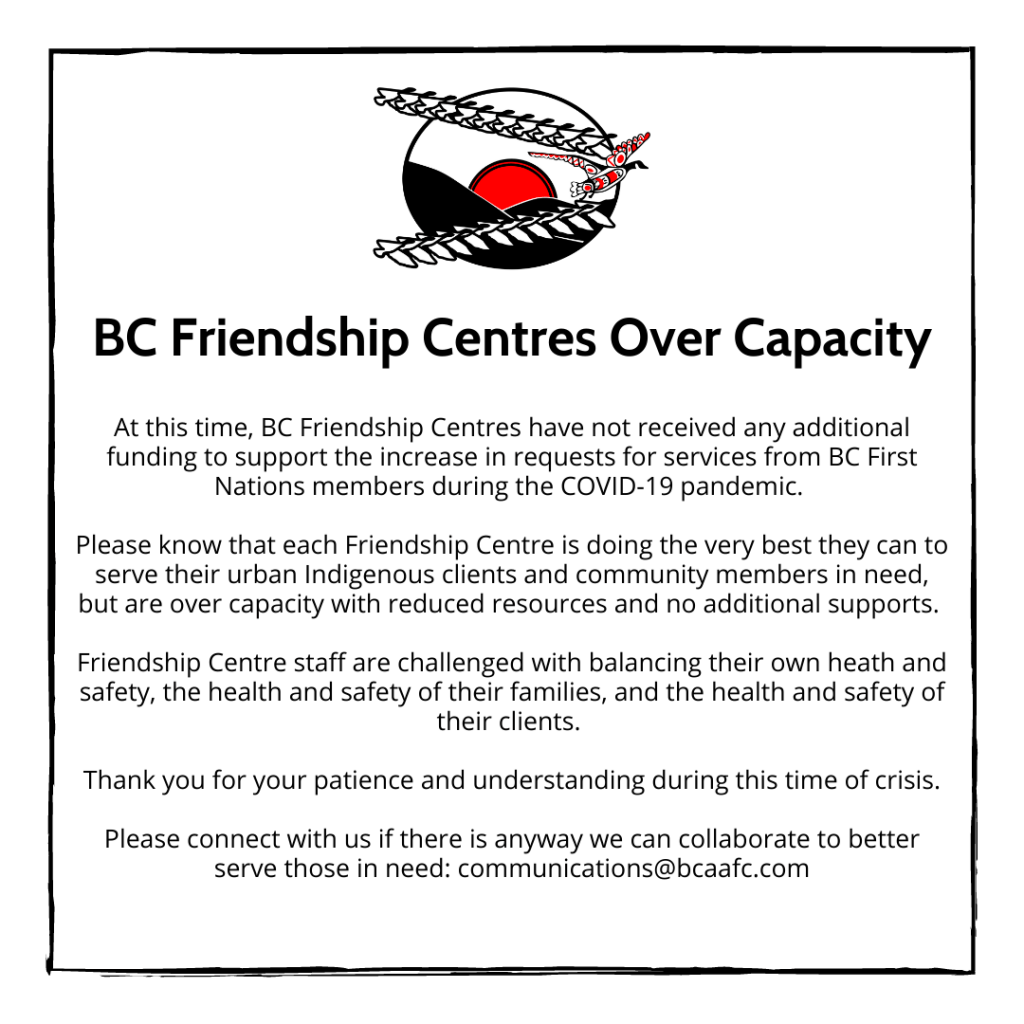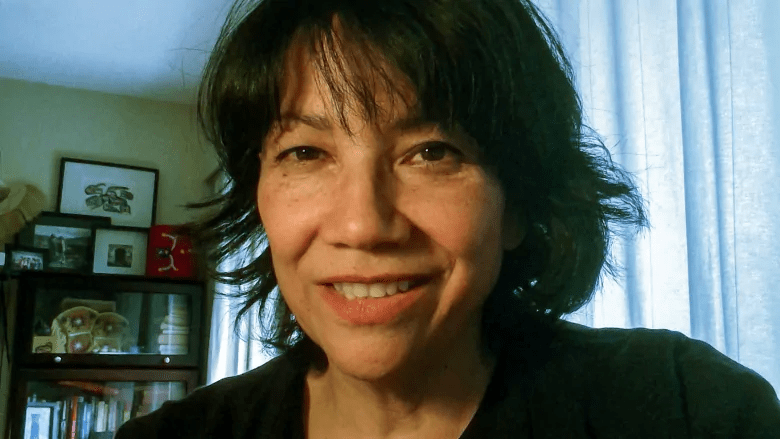

The 25 Friendship Centres located in British Columbia have not received any additional funding to support the increased need for Friendship Centre services during the COVID-19 pandemic.
The BCAAFC has requested emergency funding from the provincial government, no funding has been confirmed.
The National Association of Friendship Centres has submitted a proposal to the Indigenous Community Support Fund, no funding for Friendship Centres has been confirmed.
COVID-19 support resources: bcaafc.com/help/covid-19/
Contact: communications@bcaafc.com
At this time, BC Friendship Centres have not received any additional funding to support the increase in requests for services from BC First Nations members during the COVID-19 pandemic.
Please know that each Friendship Centre is doing the very best they can to serve their urban Indigenous clients and community members in need, but are over capacity with reduced resources and no additional supports.
Friendship Centre staff are challenged with balancing their own heath and safety, the health and safety of their families, and the health and safety of their clients.
Thank you for your patience and understanding during this time of crisis.
Please connect with us if there is anyway we can collaborate to better serve those in need: communications@bcaafc.com

Victoria, B.C. — April 8, 2020 — Friendship Centres are experiencing an increase in requests for services from First Nations communities and vulnerable populations as a result of the COVID-19 pandemic.
Collectively, Friendship Centres are the largest infrastructure serving urban Indigenous populations across Canada, providing services critical to the health and wellbeing of their clients for almost 70 years. At their core, Friendship Centres are committed to a brighter future for all, helping whoever walks through their doors in need of supports, no matter their ancestry or Indigenous status.
“We do what we can for all Indigenous people, and when we are in times of emergency, like this COVID-19 pandemic, we pull together, and do our very best to address the increased need for services,” Leslie Varley, Executive Director of the B.C. Association of Aboriginal Friendship Centres (BCAAFC), is working alongside the National Association of Friendship Centres (NAFC) to secure supports for centres providing essential and urgent services to communities. The NAFC is submitting a funding proposal to the federal government on behalf of Friendship Centres nation-wide, in hopes of receiving a portion of the $15 million in emergency funding allocated for urban Indigenous organizations.
The 25 Friendship Centres located in B.C. have a history of supporting people during times of crisis, some serving as evacuation support centres during intense wildfire seasons. During this pandemic, Friendship Centres are continuing to provide essential services whenever possible, and many are working to fulfill additional urgent needs, such as shelter services for people experiencing homelessness. Other Friendship Centres are reaching out to ensure neighbouring Indigenous communities have access to services that other groups and organizations are not providing for.
The BCAAFC is requesting additional supports from the provincial government, and seeking opportunities to collaborate with other organizations and governing bodies to ensure Indigenous and Métis people, wherever they reside, are not suffering due to jurisdictional boundaries.
The backgrounder attached outlines the requests made by Friendship Centres in order to safely provide essential and urgent services.
For more information, please contact:
Leslie Varley, Executive Director, BCAAFC
250-893-0494 | lvarley@bcaafc.com
Each Friendship Centre is an autonomous not-for-profit organization, governed by a local board of volunteer directors. Each centre develops programs and services depending on the needs identified by community members.
The province of B.C. accepts that 85% of Indigenous people in BC reside off reserve. This means many Indigenous people living off reserve are in dire need of supports and services; however, at this point, few additional services and resources are available to Friendship Centres.
The $305 million in funding announced by the federal government breaks down as follows:
– $125 million for First Nations, with a base amount for each
– $45 million for Inuit determined by Inuit Tapiriit Kanatami and land-claim groups
– $30 million for Métis Nation communities, through provincial bodies
– $15 million for Indigenous urban organizations (Canada-wide)
Across Canada, only urban Indigenous organizations, such as Friendship Centres, are required to apply for funding through a national proposal process, rather than receiving the funds allocated directly.
The National Association of Friendship Centres is submitting a proposal on behalf of all Friendship Centres for a portion of the $15 million funding available for Indigenous urban organizations.
Friendship Centres have asked for:
– Food and food vouchers to address food insecurity
– Care packages delivered to those with health problems and shut-ins
– Home kits for postpartum parents, including diapers and formula
– Cold and flu medications and other basic medications and first aid kits
– Travel supports for those who are having to resort to hitchhiking in areas like the Highway of Tears
– Taxi vouchers for those needing to get supplies or go to a doctor
– Supports for the homeless, including bedding, warm clothing, tents, and storage
– Cell phones for isolated elders, shut-ins and homeless folks so they can stay in contact with loved ones and service providers
– Hand washing stations, gloves, masks and sanitizer, for Friendship Centre staff and communities
Friendship Centres fulfill the Government of B.C.’s criteria for essential service providers, excerpt as follows:
“Vulnerable Population Service Providers
– Businesses and non-profits that provide food, shelter, social, and support services, and other necessities of life for economically disadvantaged or otherwise vulnerable individuals, such as:
– Childcare services for those persons providing essential services
– Caregivers for children in care and out of care.”
In addition to the essential services defined, many Friendship Centres also provide specialized services, such as safe transition houses for women and families fleeing violence, and social housing.
– Government of Canada. (April 6, 2020). Indigenous Community Support Fund. http://ow.ly/lgz250z86lE
– Government of British Columbia. (April 3, 2020). List of COVID-19 Essential Services. http://ow.ly/7R8l50z7V5p
Thank you to all the Elders, knowledge keepers, speakers, and language learners working to revitalize, maintain and strengthen Indigenous languages.
Whether you are just beginning or an expert, your efforts represent the strength of Indigenous languages, cultures, and traditions, despite colonial policies designed to silence them.
Language resources
FirstVoices (First Peoples’ Cultural Council) – a suite of web-based tools and services designed to support Indigenous people engaged in language archiving, language teaching and cultural revitalization.
Apps for Learning an Indigenous Language (Animikii) – a list of 30 language apps to supplement language learning.
Indigenous Languages of British Columbia (Government of British Columbia) – curriculum packages developed for grades 5 to 12
BC has the largest diversity of Indigenous languages in Canada
March 27, 2020
“First Nations communities are bracing for what will happen if COVID-19 reaches their doors. Some have declared their own states of emergency, and are banning outsiders to prevent COVID-19 from infecting their communities.
But it is impossible to capture the full picture of Indigenous health in Canada without looking at urban Indigenous communities.
More than 60 per cent of Indigenous people in Canada live off-reserve. Many urban Indigenous organizations worry the people they serve are particularly vulnerable to COVID-19, and could fall through the cracks.
Leslie Varley, the executive director of the B.C. Association of Aboriginal Friendship Centres, spoke to The Sunday Edition‘s host Michael Enright about what COVID-19 means for urban Indigenous people.”
Listen to the full interview here
